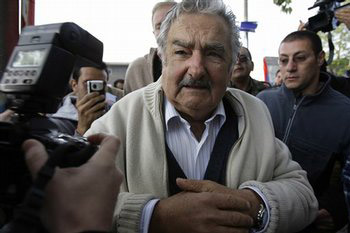
|  |  |  Americas & Beyond | October 2009 Americas & Beyond | October 2009  
Ex-Guerrilla Just Shy of Outright Win in Uruguay
 Michael Warren - Associated Press Michael Warren - Associated Press
go to original
October 26, 2009


| | Jose "Pepe" Mujica, 74, the candidate of the governing Broad Front leftist coalition, arrives at a polling station to cast his vote during Uruguay's general elections in Montevideo, Sunday, Oct. 25, 2009. (AP/Eduardo Di Baia) |  |
Montevideo, Uruguay — A blunt-talking former guerrilla fell just short of a first-round victory in Uruguay's presidential election, according to results Monday, and his conservative opponents have united in hopes of leaping past him in a Nov. 29 runoff.

Jose "Pepe" Mujica, the candidate of the governing leftist Broad Front coalition, got 47.5 percent of the votes Sunday, just below the majority needed to win outright.

Conservative ex-president Luis Alberto LaCalle got 28.5 percent, and Pedro Bordaberry of the Colorado Party 17 percent with 99.9 percent of the votes counted, the electoral court said Monday.

Bordaberry immediately endorsed Lacalle in hopes of keeping the leftist out of the presidency, but Mujica said his coalition will still have the edge against the combined center-right rivals.

Mujica said the nation of 3.4 million people can become something like Finland, with a diversified economy that creates well-paid jobs and also provides for "the people who have the least."

Lacalle wants to reduce taxes and said he would "go in with a chain saw" to downsize government. He argued his center-right party "is the better option for the security, certainty, peace and dialogue Uruguay needs."

"Don't call it a fight. A fight leaves people injured," added Lacalle, who now must find new allies inside the Broad Front coalition. "We are reaching out for dialogue – we are the ones who have the capacity to form parliamentary and social majorities."

Mujica was a leader of the Tupamaru guerrillas, who were inspired by the Cuban revolution to organize kidnappings, bombings, robberies and other attacks on the conservative but democratically elected governments of the 1960s. Convicted of killing a policeman in 1971, he endured torture and solitary confinement during nearly 15 years in prison.

In the quarter-century since he was freed, however, Mujica, now 74, helped transform the guerrillas into a legitimate political movement, became the top vote-getter in Congress and served as agriculture minister under outgoing socialist President Tabare Vazquez, whose victory ended decades of center-right rule five years ago.

In the spectrum of Latin leaders, Mujica may turn out to be something like Brazil's President Luiz Inacio Lula da Silva – "someone who in his youth was more of a radical leftist, who is now convinced that the best way to help the poor and achieve social justice is to maintain a moderate path," said Mark Jones, a political scientist and Uruguay expert at Rice University in Texas.

Mujica's life story – and his penchant for saying what he thinks in salty, workingman's slang – have resonated with supporters, who see him as an authentic socialist and anti-politician with the power to shake up the country's bureaucracies.

Opponents worry that if he becomes president, he could choke the economy and embarrass the nation with his off-the-cuff remarks.

Jones says both sides can probably relax. Uruguay's stable, parliamentary democracy tends to thwart radical changes and the leftists lost seats in Congress, which will force more consensus-building.

"It's not like Mujica can do anything on his own," Rice said. "Even if he was more radical, the Uruguayan system will keep him in check."

Lacalle, 69, survived a bombing of his house and an attempt to poison him with doctored bottles of wine in the 1970s. He pushed hard to privatize government agencies as president in 1990-95. This time, he would remove the income tax that Vazquez imposed and said he would take "a chain saw" to the bureaucracy

Lacalle helped found the Mercosur trade bloc, which is headquartered in Montevideo, but said it has become too political. He also criticized Unasur, the 12-nation South American group, as just "another setting for conflicts."

Two voter initiatives – one to remove amnesty for human rights abuses under the 1973-85 dictatorship and another to enable mail-in votes by citizens living outside Uruguay – also failed to win majorities, gaining 42 percent and 33 percent, respectively.

The eventual presidential winner will take office March 1.
|

 |
|  |



